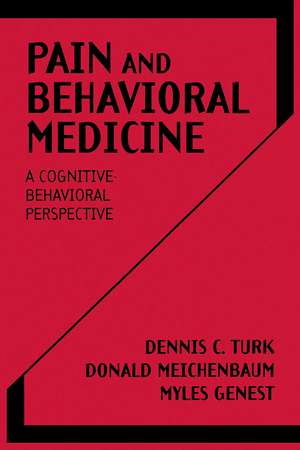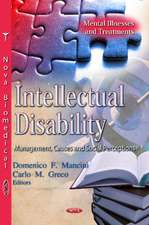Pain and Behavioral Medicine: The Guilford Clinical Psychology and Psychopathology Series
Autor Dennis C. Turk, Donald Meichenbaum, Myles Genesten Limba Engleză Paperback – 25 dec 1987
Preț: 426.07 lei
Preț vechi: 448.50 lei
-5% Nou
Puncte Express: 639
Preț estimativ în valută:
81.53€ • 85.35$ • 67.46£
81.53€ • 85.35$ • 67.46£
Carte tipărită la comandă
Livrare economică 07-21 aprilie
Preluare comenzi: 021 569.72.76
Specificații
ISBN-13: 9780898629170
ISBN-10: 0898629179
Pagini: 452
Dimensiuni: 152 x 229 x 30 mm
Greutate: 0.7 kg
Ediția:Revised
Editura: Guilford Publications
Colecția Guilford Press
Seria The Guilford Clinical Psychology and Psychopathology Series
ISBN-10: 0898629179
Pagini: 452
Dimensiuni: 152 x 229 x 30 mm
Greutate: 0.7 kg
Ediția:Revised
Editura: Guilford Publications
Colecția Guilford Press
Seria The Guilford Clinical Psychology and Psychopathology Series
Public țintă
Postgraduate, Professional, Professional Practice & Development, and UndergraduateCuprins
I. The Nature of Cognitive-Behavior Modification: Application to Behavioral Medicine
1. A Cognitive-Behavioral Perspective of the Therapy Process
2. Behavioral Medicine: A Cognitive-Behavioral Perspective
3. Behavioral Medicine: Cognitive-Behavioral Applications in Health Promotion, Disease, and Illness
II. Pain: A Cognitive-Behavioral Perspective
4. Pain: Its Impact
5. Psychological Variables and Pain
6. Chronic Pain: Psychologically Oriented Approaches to Treatment
7. Current Psychological Treatments for Pain: A Cognitive-Behavioral Perspective
III. Cognitive-Behavioral Treatment of Pain
8. Patient Resistence, Treatment Adherence, and Therapist Styles
9. Initial Phase of Cognitive-Behavioral Treatment: Part I
10. Initial Phase of Cognitive-Behavioral Treatment: Part II
11. Skills-Acquisition and Consolidation Phase: Part I
12. Skills-Acquisition and Consolidation Phase: Part II
13. Application and Follow-Through Phase
IV. Future Directions
14. Afterthoughts and Implications
Appendix A. Instructions for Behavioral Trials
Appendix B. Information to Referral Sources
Appendix C. Patient Pain Questionnaire
Appendix D. Significant Others Pain Questionnaire
Appendix E. Voluntary Control of Appraisal
1. A Cognitive-Behavioral Perspective of the Therapy Process
2. Behavioral Medicine: A Cognitive-Behavioral Perspective
3. Behavioral Medicine: Cognitive-Behavioral Applications in Health Promotion, Disease, and Illness
II. Pain: A Cognitive-Behavioral Perspective
4. Pain: Its Impact
5. Psychological Variables and Pain
6. Chronic Pain: Psychologically Oriented Approaches to Treatment
7. Current Psychological Treatments for Pain: A Cognitive-Behavioral Perspective
III. Cognitive-Behavioral Treatment of Pain
8. Patient Resistence, Treatment Adherence, and Therapist Styles
9. Initial Phase of Cognitive-Behavioral Treatment: Part I
10. Initial Phase of Cognitive-Behavioral Treatment: Part II
11. Skills-Acquisition and Consolidation Phase: Part I
12. Skills-Acquisition and Consolidation Phase: Part II
13. Application and Follow-Through Phase
IV. Future Directions
14. Afterthoughts and Implications
Appendix A. Instructions for Behavioral Trials
Appendix B. Information to Referral Sources
Appendix C. Patient Pain Questionnaire
Appendix D. Significant Others Pain Questionnaire
Appendix E. Voluntary Control of Appraisal
Notă biografică
Dennis C. Turk is Professor of Psychiatry, Anesthesiology, and Behavioral Science, and Director of the Pain Evaluation and Treatment Institute at the University of Pittsburgh Medical Center. He has published over 170 journal articles and chapters in books. Among the seven books he has either authored or edited are «MDUL»Pain and Behavioral Medicine«MDNM», «MDUL»Pain Management: A Handbook of Psychological Treatment Approaches«MDNM», and «MDUL»Facilitating Treatment Adherence: A Practitioner's Guidebook«MDNM». A founding member of both the International Association for the Study of Pain and the American Pain Society, Dr. Turk is a Fellow of the American Psychological Association, the Academy of Behavioral Medicine Research, and the Society of Behavioral Medicine.






















